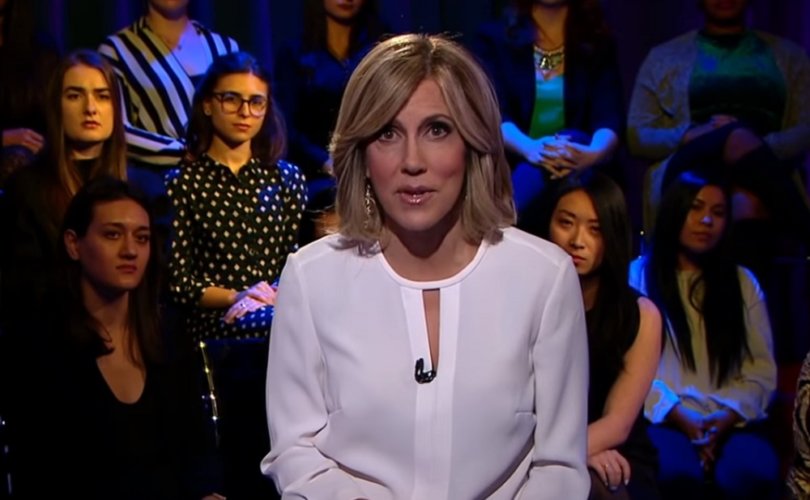June 24, 2019 (LifeSiteNews) — A CNN host repeatedly questioned a guest in a recent on-air exchange on why families shouldn’t be allowed to abort their unborn children for being disabled.
Alisyn Camerota, anchor of CNN’s morning show New Day, seemed genuinely perplexed during her interview with Indiana attorney general Curtis Hill about why anyone would want a family to “have to have” a disabled child. The interview occurred one day after the U.S. Supreme Court overturned part of a 2016 Indiana law banning abortion based on a child’s race, sex, or disability in late May.
Specifically questioning the aspect of the law banning abortion based on an unborn child’s disability, Camerota pressed Hill in an emphatic, dramatic tone, seeming at a loss, as though such an abortion ban were inconceivable.
“I’m just curious about that one,” she said. “Why, why would you want a family to have to have a child with a severe disability?”
From just this morning: watch as CNN's Alisyn Camerota repeatedly asks why we shouldn't just kill all the babies with disabilities. pic.twitter.com/eS7BdEGyn9
— Matt Wolking (@MattWolking) May 29, 2019
Indiana’s attorney general remained measured as he clarified that the matter at hand was the right of the unborn child not to be the object of discrimination based on his disability (or for race).
“Well, the issue that the general assembly faced was not with regard to the question you pose,” Hill replied. “It’s the question of the rights and consideration of the unborn child in terms of discriminatory actions of eliminating that opportunity at life.”
“Making a decision based solely on race or disability certainly is a discriminatory practice,” he said. “And no decision in terms of whether or not to have a child should be based on that solely. And that’s what the general assembly chose to do in its ban.”
Camerota responded to Hill with a quick and murmured “yeah,” then continued in the line of questioning with her seemingly baffled demeanor.
“But that confuses me,” she said. “Because as you know there are lots of terminations of pregnancies based on the fact that there are severe abnormalities of a fetus. And so why would you take away that choice from a family?”
Hill persisted steadily in explaining that the issue is the morality of aborting a child because the child has a disability.
“Well it’s not a matter of taking away that choice,” he told Camerota. “It’s a matter of making a decision solely on the basis of not wanting a child because the child doesn’t have a particular characteristic.”
Hill then expounded on how many families have accepted disabled children and that the children have had worthwhile lives.
“We have certainly examples every day of children who appear to have disabilities or concerns or problems, prenatal, that are born and live very productive lives and families who support those children,” he said.
“Yeah,” came Camerota’s response, seemingly incredulous, before Hill told her again, “So it’s a matter of whether or not it’s appropriate to use that as a sole basis.”
The exchange between Camerota and Hill was shared on Twitter the day of the broadcast and picked up later in a Live Action report.
Children with prenatal diagnoses such as Down syndrome or a fetal anomaly deeming them “incompatible with life” are aborted at high rates worldwide. Doctors are often quick to presume that abortion is desired, suggest abortion, and even pressure parents to abort in these scenarios, even though children can often defy these diagnoses.
However, countless families accepting of life in these instances have testified that an adverse prenatal diagnosis does not diminish the sanctity of a child’s life, frequently expressing gratitude for the gift of their children even when the child’s life is brief in length. Many families who have a child with Down syndrome have given witness to the fact that they live full lives filled with joy, as do the individuals themselves.
The Supreme Court issued a May 28 ruling upholding the part of the 2016 pro-life Indiana law requiring humane disposal of fetal remains, while also allowing a lower court ruling to stand that had struck down the law’s ban on abortions based on the child’s race, sex, or disability.
CNN’s hosts have displayed a bias in favor of abortion in the past.
Last month, CNN contributor and former New York City Democratic politician Christine Quinn said on the air, “When a woman gets pregnant, that is not a human being inside of her. It's part of her body.” Quinn denied that a human life is rated at conception, stating, “That is not science.”
Quinn was debating former senator Rick Santorum (R-Pa.) on Cuomo Prime Time with CNN host Chris Cuomo about a recent wave of pro-life bills at the state level that ban abortion once a fetal heartbeat can be detected.
Cuomo allowed Quinn’s non-factual assertion to stand. He also said during the exchange that it is “not a legal fact” that a baby dies during an abortion and invoked the debunked media narrative produced by the abortion lobby prior the Roe v. Wade decision that women “were killing themselves in back alleys” before Roe.
In February, CCN’s Erin Burnett Outfront featured discussion of Virginia Democrat Governor Ralph Northam, including the governor’s shocking defense of a radical abortion expansion bill. When during the discussion, Republican writer, commentator, and economist Stephen Moore pointed out Northam’s extreme remarks, he was shut down by both his fellow panelists and the program’s host, Burnett, who in response to Moore’s comments maintained a sarcastic look on her face for the duration of the exchange.
CNN is also facing a multi-million-dollar lawsuit for its coverage of the encounter last January between Native American activist Nathan Phillips and Covington Catholic High School teenager Nicholas Sandmann.

